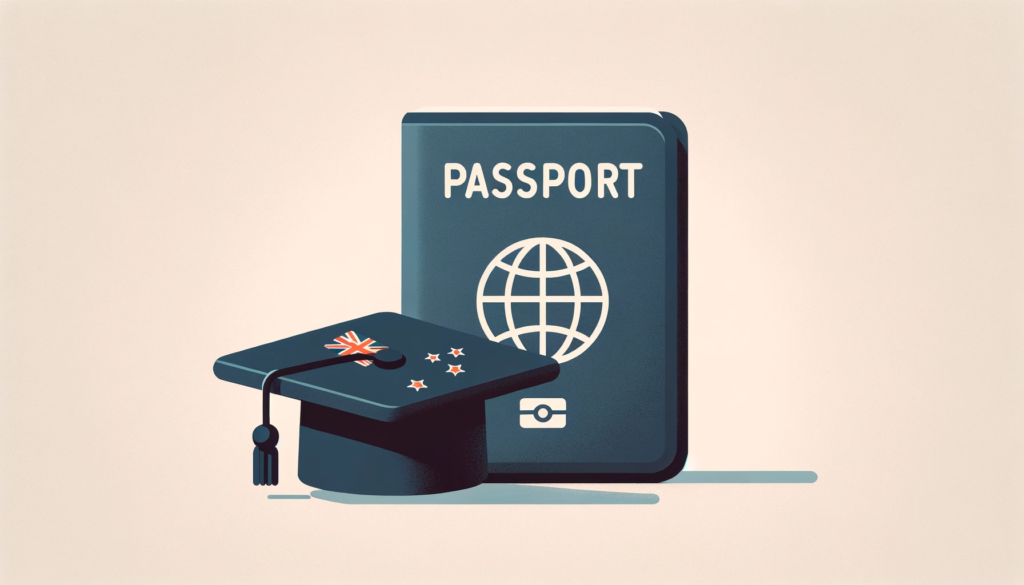1. Introduction: Embracing Education in New Zealand
New Zealand, celebrated for its majestic landscapes, is equally renowned as a center of educational excellence. Attracting a substantial number of international students each year, it stands as a preferred choice for higher education. Here’s a snapshot of recent student visa data:
Year | Total Student Visa Applications | Approved Visas | Approval Rate |
2018/19 | 89,096 | 82,176 | 92% |
Up to July 2023 | 53,428 | 47,057 | 88% |
source : https://monitor.icef.com/
This data demonstrates New Zealand’s appeal, drawing 80,000 to 90,000 international students annually to its reputable institutions and culturally diverse, safe environment.
Understanding the nuances of New Zealand’s student visa requirements is crucial for these students. More than just a travel permit, a student visa is a gateway to transformative education and enriching personal experiences. Effective navigation of these requirements is essential for a smooth and immersive academic journey in New Zealand.
2.Overview of New Zealand’s Student Visa
The New Zealand Student Visa facilitates the entry of a diverse international student body. The largest contingents come from China and India, with significant numbers from South Korea, the Philippines, Japan, European countries like Germany and France, and South American nations including Brazil and Colombia.
Educational Programs and Popular Courses:
- Business and Management: Courses, especially at the postgraduate level like MBAs, are highly popular.
- Engineering and Technology: Reflecting the demand in New Zealand’s growing tech industry.
- Health Sciences: Fields like nursing, pharmacy, and public health are in demand globally.
- Information Technology: With a booming tech sector, courses in IT and computer science are favorites.
- Agricultural and Environmental Sciences: Unique to New Zealand’s robust agricultural sector.
Recent policy updates include the refinement of post-study work rights and the introduction of the Pathway Student Visa, enhancing flexibility in educational pathways.
3. Eligibility Criteria for New Zealand Student Visa

Securing a student visa for New Zealand requires meeting specific eligibility criteria, ensuring that students are well-prepared for their academic journey. Below is a breakdown of these key requirements:
- Academic Qualifications:
- Enrollment: Students are required to be registered as full-time students at an accredited educational institution in New Zealand
- Academic Records: Proof of relevant academic achievements and qualifications tailored to the chosen study program.
- English Language Proficiency:
- Testing Requirements: For non-native English speakers, proficiency tests like IELTS or TOEFL are mandatory. The typical score requirement ranges from IELTS 5.5 to 6.5.
- Test Selection: The choice of test (IELTS, TOEFL, etc.) depends on the institution’s requirements.
- Financial Requirements:
- Living Expenses: As per the official New Zealand government guidelines, students need to demonstrate access to at least NZ$20,000 per annum to cover living costs, or NZ$17,000 for primary and secondary school students.(source:https://www.studywithnewzealand.govt.nz/)
- Tuition Fees: Proof of funds to cover tuition for the course duration.
- Funds Verification: Acceptable proof includes bank statements, financial undertakings by sponsors, or scholarship awards.
- Travel Costs: Evidence of funds for a return ticket home or the ticket itself.
4. Application Process for New Zealand Student Visa
Step-by-Step Guide:
- Choose a Certified Education Provider: Before applying, ensure your chosen institution is accredited by the New Zealand Qualifications Authority (NZQA).
- Gather Required Documents: This includes proof of acceptance from your education provider, evidence of sufficient funds, passport, and academic records.
- English Proficiency Test: If applicable, take an approved English language proficiency test like IELTS or TOEFL.
- Health and Character Certificates: Obtain a medical examination and police certificate to prove your good health and character.
- Complete the Application Form: Fill out the student visa application form, either online via the Immigration New Zealand (INZ) website or by submitting a paper application.
- Pay the Application Fee: Fees can be paid online or as instructed in the paper application.
- Submit Your Application: Double-check all details and submit your application along with all the required documents.
Online vs. Paper Application:
- The online process is generally faster and more efficient, allowing for easy submission of documents and payment.
- Paper applications are available but may involve longer processing times and additional courier fees.
Documentation Required:
- Passport-size photograph.
- Passport with at least three months’ validity beyond the planned date of departure from New Zealand.
- Offer of place from an approved education provider.
- Evidence of funds and accommodation.
- Health insurance coverage.
- Health and police clearance certificates.
Tips for a Successful Application:
- Ensure all documents are complete, accurate, and up-to-date.
- Provide clear evidence of your intention to leave New Zealand after your studies.
- Ensure to apply well in advance of your course’s commencement date.
5. Fees and Processing Time
Visa Application Fees:
- As of the latest update, the student visa application fee ranges from NZD 250 to NZD 330, depending on the applicant’s nationality and where the application is made.
- Additional charges may include service fees for online applications and costs for health examinations and police clearances.
Processing Times:
- On average, processing times range from 20 to 50 days, but this can vary based on the completeness of the application, the need for additional information, and peak application periods.
- Applications from certain countries or with complex circumstances may take longer.
Recent Visa Processing Statistics:
- Approximately 75% of student visa applications are processed within 30 days.
- Delays often occur due to incomplete applications or during peak periods around the start of academic semesters.
6. Post-Application Process
After Submission:
- Once submitted, INZ assesses the application and may request additional information.
- Some applicants may be required to attend an interview.
Biometrics, Health Checks, and Interviews:
- Applicants from certain countries may need to provide biometric information.
- Health checks must be conducted by an approved panel physician.
- If an interview is required, it will typically focus on your study plans, financial stability, and reasons for choosing New Zealand.
Tracking the Application Status:
- The progress of an online application can be monitored via the INZ online portal.
- For paper applications, applicants may receive updates via email or can contact the visa processing center directly.
Sure, here’s detailed and data-oriented content for the specified sections of your blog on New Zealand’s student visas:
7. Visa Approval and Conditions
Once a student visa is approved, it’s crucial to understand and adhere to its conditions to maintain legal status in New Zealand.
Next Steps After Approval:
- Upon receiving visa approval, review all conditions attached to the visa carefully.
- Plan your travel to New Zealand to align with your course start date, as specified in the visa.
Visa Conditions:
- Work Rights: Typically, student visas permit working up to 20 hours per week part-time during the school term and full-time during official holidays. Nevertheless, students pursuing PhDs and Masters by research have the allowance to work full-time
- Travel Limitations: The visa typically allows multiple entries into the country. However, ensure your visa is valid for the duration of your stay and check any travel restrictions.
- Visa Extension: To extend your visa, you must apply before the current one expires, with proof of continued enrolment and sufficient funds.
- Maintaining Legal Status: Attend the institution listed on your visa, make satisfactory academic progress, and adhere to New Zealand laws.
8. Working While on a Student Visa

Working while studying can offer practical experience and financial support, but it’s important to understand the rules.
Rules and Restrictions:
- Permission to work is automatically granted with most student visas.
- Students cannot be self-employed but must work as an employee with an employment agreement.
Permissible Work and Hours:
- Allowed to work up to 20 hours a week during the academic term and full-time during holidays.
- Work hours for Masters by research and PhD students are unrestricted.
Impact on Academic and Visa Status:
- Working beyond the permitted hours can lead to visa cancellation.
- Balancing work and study is crucial to maintaining academic progress, a requirement for the visa.
9. Transitioning from Student to Post-study Work Visa
Post-study work visas offer an opportunity to gain work experience in New Zealand after graduation.
Pathways and Criteria:
- Post-Study Work Visa – Open: Allows work for any employer for 1-3 years, depending on the level and location of your study.
- Employer-Assisted Post-Study Work Visa: Linked to a specific job with a specific employer for up to 2 years.
Application Process:
- Apply within 3 months of the expiry of your student visa (or 6 months if you have a doctoral degree).
- Provide evidence of your qualification and a job relevant to your studies.
10. Compliance and Potential Issues
Maintaining compliance with visa conditions is crucial to avoid legal issues.
Common Compliance Issues:
- Working more than allowed hours.
- Failing to maintain satisfactory academic progress.
- Not adhering to the terms of the specific visa (e.g., working in a field unrelated to study).
Dealing with Visa Violations:
- In case of a potential violation, it’s advisable to seek legal advice or consult with your educational institution’s international student office.
- Immigration New Zealand can provide guidance on rectifying minor breaches.
- Serious violations can lead to visa cancellation and potential deportation.
Zealand. Ensure that this information is regularly updated with the latest guidelines from Immigration New Zealand to maintain accuracy.
11. Family Visa Options for International Students in New Zealand

International students in New Zealand have several visa options to bring their family members along, ensuring a supportive environment during their studies. Here’s a concise overview:
1. Partner of a Student Work Visa:
For partners to live and work in New Zealand.
Duration usually matches the student’s study visa.
Applicable for students enrolled in courses eligible for the Skilled Migrant Category.
2. Partner of a NZ Scholarship Student Work Visa:
Tailored for partners of scholarship students.
Allows work for the scholarship’s duration.
3. Partner of a Student Visitor Visa:
Ideal for partners visiting or accompanying the student without working rights.
Validity coincides with the student’s course duration.
4. Child of a Student Visitor Visa:
Enables children of students to reside in New Zealand.
Aligned with the duration of the parent’s study visa.
5. Dependent Child Student Visa:
For children attending primary or secondary school.
Permits study as a domestic student, exempting international fees in state schools.
6. Guardian of a Student Visitor Visa:
For legal guardians accompanying a student.
Especially useful for younger students.
Application Essentials:
Proof of relationship (marriage or birth certificates).
Evidence of financial stability and health insurance.
Can be applied for either simultaneously with the student visa or post the student’s arrival.
12. Student Life in New Zealand & Understanding the Cost of Living

New Zealand offers a unique and enriching environment for international students, blending academic excellence with a vibrant lifestyle. Here’s an overview of the student life and an insight into the cost of living and tuition fees.
Tuition Fees Overview:
- School Fees: State schools start at around $11,000 for primary and $14,000 for secondary schools annually. Private schools start at about $25,000 annually.
- Diplomas/Certificates: Costs vary, such as $23,376 for a New Zealand Certificate in Engineering or $46,752 for a one-year Diploma in Computing.
- Bachelor’s Degrees: Fees range from $20,000 to $40,000, with courses like medicine and veterinary science at the higher end. Most bachelor’s degrees take three years.
- Postgraduate Degrees: These range from $20,000 to $45,000, with higher fees for specialized fields.
- PhDs: International PhD students usually pay $6,500 to $7,500 per year, similar to New Zealand students.
- English Language Courses: General courses might cost $350 per week, while a 12-week Cambridge English exam course could be around $5,100.
Living Costs:
- Costs vary based on lifestyle and location. Living in a smaller town might be cheaper than in a big city.
- Universities like Victoria University of Wellington and the University of Auckland estimate annual living costs between $20,000-$27,000. The University of Otago estimates $18,000-$21,000.
- For student visa applications, proof of at least NZ$20,000 (or NZ$17,000 for school years 1-13) is required to cover the first year of living expenses.
Student Life Experience:
- Campus Culture: Dynamic environments with clubs, societies, sports, arts, and social activities.
- Accommodation: Includes on-campus housing, off-campus shared apartments, homestays, or private rentals.
- Support Services: Academic support, health and counseling, and career services.
- Cultural Adaptation: Orientation programs, language support, and cultural associations for smoother integration.
- Community Engagement: Opportunities to volunteer and participate in local events.
- Safety: New Zealand is safe, but it’s important to be aware of surroundings and understand emergency procedures.
Maximizing the Experience:
- Engage in campus life and local community events.
- Maintain a balance between academic responsibilities and exploring New Zealand.
13. Conclusion: Maximizing Your New Zealand Study Experience
In summary, New Zealand offers a vibrant and enriching environment for international students, combining high-quality education with an unparalleled living experience. From understanding the application process for a student visa, meeting eligibility criteria, to complying with visa conditions while studying and working, each step is crucial in shaping a successful educational journey in New Zealand.
It is imperative for students to adhere to the conditions of their visas, not only to maintain legal status but also to fully benefit from what New Zealand has to offer. Whether it’s through part-time work opportunities, engaging in diverse cultural experiences, or transitioning to a post-study work environment, the experiences gained here can be invaluable. Students are encouraged to immerse themselves in the academic and social life of this unique country while respecting its laws and regulations.
Partner with ICL Immigration for Your Journey
Based in Auckland, NZ, for 20 years and in partnership with over 20 institutes, ICL Immigration simplifies your journey from studying to settlement in New Zealand. Our services include:
- Admission and University Selection: Tailored matching to the best programs, guiding you through university applications and meeting deadlines.
- Student Visa Facilitation: Comprehensive assistance in visa application processes, ensuring compliance with ongoing communication with Immigration New Zealand.
- Post-Arrival and Settlement Support: Pre-departure briefings on New Zealand’s culture, accommodation aid, and local orientation upon arrival.
- Resident Visa and Pathway to Residency: Expert guidance in transitioning to a resident visa post-study and support in the permanent residency application process.
With ICL Immigration, your transition from student to professional nurse in New Zealand is seamless, ensuring you are well-prepared for every step of your journey.
Disclaimer:
For the latest data and more detailed information, always refer to the official Immigration New Zealand or NewZealand government website.
Reference














